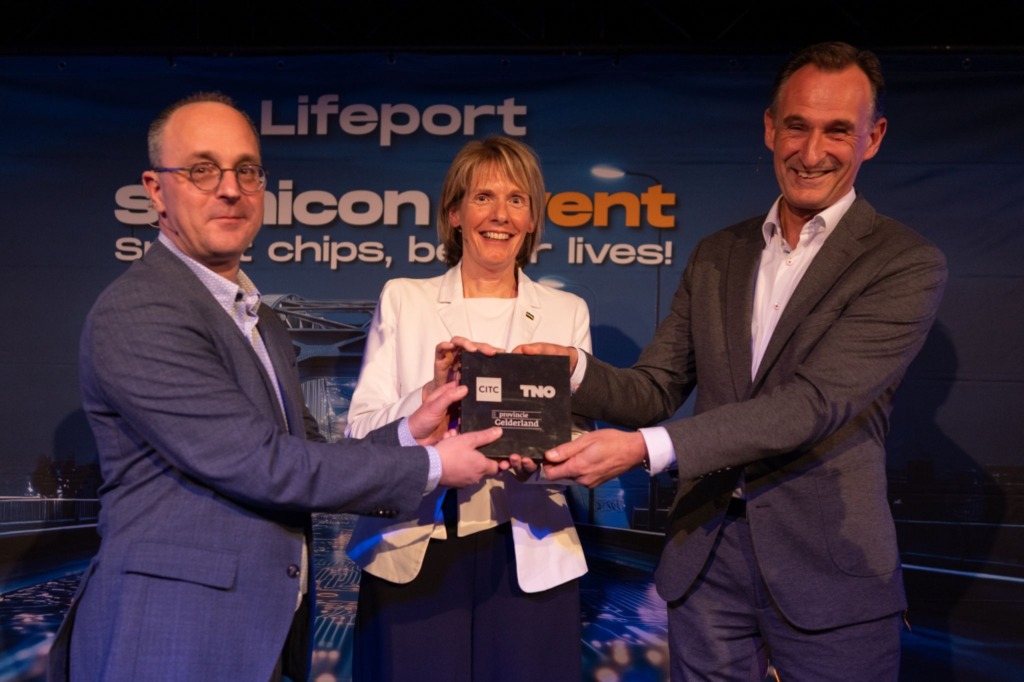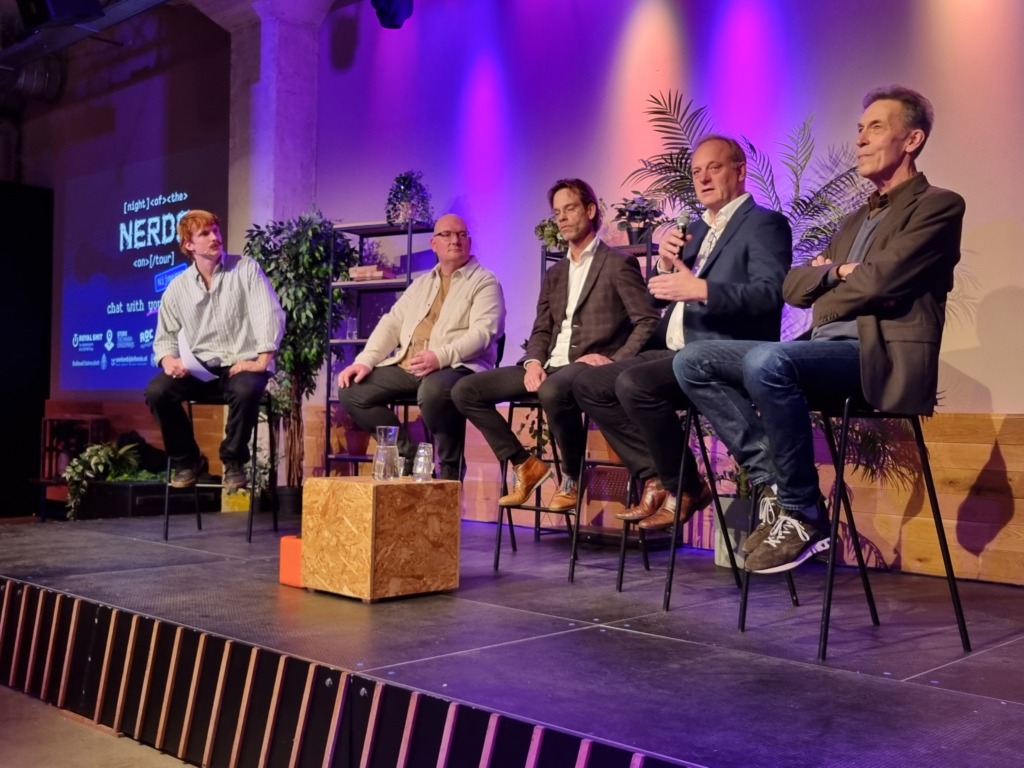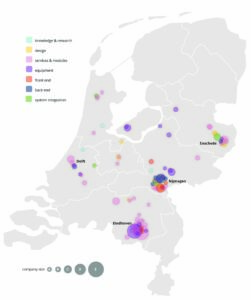Christelle Le Cam werkt al ruim 25 jaar in de halfgeleiderwereld. Haar onderzoeksjaren in Eindhoven vormden het startpunt van een internationale carrière in chipinnovatie. In dit interview vertelt ze waarom de Lifeport-regio zo’n vruchtbare bodem is voor semicon-innovatie, waarom Europa moet versnellen en hoe Edge-AI de komende jaren onze wereld zal veranderen.
Waarom scoort de Lifeport-regio zo goed op technologie en R&D in de semiconductorsector?
“Deze regio is al decennialang een hotspot voor chipontwerp en -productie in Nederland,” antwoordt Christelle Le Cam, Senior Director Front End Innovation bij NXP Semiconductors. “Elke auto die wereldwijd van de band rolt, bevat chips die hier zijn ontworpen of geproduceerd. Dat zegt iets over de kracht van ons ecosysteem.”
Halfgeleiders zijn onzichtbaar, maar vormen de stille motor achter vrijwel alles wat we doen. Van gezondheidszorg tot energie en van landbouw tot mobiliteit: overal zitten chips in. “Juist in die domeinen heeft Nederland sterke posities,” vervolgt ze. “Landbouw rond Wageningen, energie in de regio Arnhem, medische innovaties in Nijmegen. Als we die werelden dichter bij elkaar brengen, ontstaat een versneller voor innovatie.”
De Noviotech Campus speelt daarin een belangrijke rol: “We bouwen daar aan een netwerk dat niet alleen laat zien wat er beschikbaar is, maar vooral waarom dat waardevol is.”
Talent is cruciaal
U benadrukt dat Europa moet investeren in technologie en partnerschappen om wereldwijd concurrerend te blijven. Welke stappen zijn daarin essentieel voor Lifeport Regio Arnhem Nijmegen?
“Talent is de sleutel,” antwoordt Le Cam zonder aarzelen. “Met de opkomst van AI hebben we nieuwe en andere competenties nodig. Dat betekent investeren in opleidingen en in het bijscholen van mensen die al in de sector werken. Langetermijninvesteringen in talent zijn uiteindelijk de motor van innovatie.”
Daarnaast is een aantrekkelijk vestigingsklimaat essentieel. “Denk aan de 30%-regeling, WBSO (Wet Bevordering Speur- en Ontwikkelingswerk) en subsidies voor R&D-projecten, zoals IPCEI (Important Project of Common European Interest). Omdat Gelderland hierin meefinanciert, ontstaan extra kansen om de regio te versterken.”
Ze verwijst ook naar het ‘rapport Wennink’, dat bedrijven oproept meer in R&D te investeren. “We moeten niet alleen naar kosten kijken, maar vooral naar waarde op de lange termijn. Maak het aantrekkelijk voor bedrijven om mee te doen.”
Ecosysteem
U geeft aan hoe belangrijk samenwerking is tussen bedrijven, kennisinstellingen en overheden. Kunt u een concreet voorbeeld noemen van zo’n succesvolle samenwerking in de regio?
“NXP is al jaren betrokken bij het Triple Helix-programma in het Brainport-ecosysteem,” vertelt Le Cam. “Dat model werkt goed. Ik denk dat vergelijkbare initiatieven ook hier in de Lifeport-regio kunnen groeien.”
De regio heeft volgens haar een unieke ‘semiconsignatuur’: “Bedrijven en kennisinstellingen werken hier al goed samen. Daardoor kunnen nieuwe ideeën snel worden getest en opgeschaald. Vooral in ontwerp, industrialisatie en advanced packaging liggen grote kansen, zeker nu producten steeds vaker meerdere chips en technologieën combineren.”
Slimme rekenkracht
U spreekt over ‘building systems at the edge’ en robotica. Hoe vertaalt dit zich naar toepassingen in de Lifeport-regio?
Le Cam: “Edge-AI betekent dat slimme rekenkracht niet in de cloud zit, maar in het apparaat zelf. In een auto, een machine, medische apparatuur. Dat maakt systemen sneller, veiliger en energiezuiniger. Niet alles kan of wil je naar de cloud sturen.”
Bij NXP wordt wereldwijd samengewerkt aan deze technologieën. “Innovatie ontstaat zelden op één plek. Het is meestal een internationale inspanning.”
Gunstig innovatieklimaat
Welke initiatieven zijn nodig om jonge onderzoekers en ingenieurs aan te trekken en te behouden?
“Talent aantrekken en behouden gebeurt niet vanzelf,” aldus Le Cam. “Daarbij spelen verschillende voorwaarden mee, zoals een gunstig innovatieklimaat. Bedrijven kun je bijvoorbeeld stimuleren met belastingvoordelen of subsidies, zodat we blijven concurreren met landen met lagere lonen. Net zo belangrijk is dat gezinnen uitzicht hebben op een fijne toekomst, met goede huisvesting, scholen en bereikbaarheid.”

Noviotech Campus
Wat is de rol van Lifeport Regio Arnhem Nijmegen in internationale projecten? En wat betekent dit voor lokale bedrijven en startups?
Le Cam: “Nederland heeft een sterk ecosysteem van bedrijven, universiteiten, overheid en startups. Maar dat werkt alleen als we consistent blijven investeren. Programma’s als het FNS 6G groeifonds, IPCEI en WBSO helpen om innovatie en banen te behouden.
De grootste uitdaging is ervoor te zorgen dat regionale krachten goed worden benut en niet versnipperd raken. Met langetermijninvesteringen in talent kunnen we grote stappen maken.
De Noviotech Campus laat mooi zien hoe publieke en private partners samen een plek bouwen die samenwerking mogelijk maakt. Het uitbreiden van die campus is een mooie ambitie.”
Klaar voor de toekomst
Welke trends of doorbraken verwacht u de komende 5–10 jaar in de semiconductortechnologie en hoe kan de regio Arnhem–Nijmegen daarop inspelen?
“Door voort te bouwen op de samenwerking en innovatie die er al is, kan deze regio echt voorop blijven lopen in Edge-AI. AI komt steeds dichter bij mensen en apparaten, in auto’s, machines en medische apparatuur. Robotica spelen een steeds grotere rol in fabrieken en in ons dagelijks leven. Dat biedt enorme kansen: voor slimme technologie, nieuwe banen en een regio die klaar is voor de toekomst.”
Lifeport Semicon Event
Christelle Le Cam was keynotespreker tijdens het Lifeport Semicon Event op 27 januari. Haar lezing droeg de titel Intelligent Systems at the Edge through Successful Collaboration Across the Ecosystem.
Op dinsdag 27 januari verzamelden vakgenoten zich in het Goffertstadion in Nijmegen voor een bijeenkomst vol nieuwe ideeën, frisse perspectieven, lezingen en gesprekken. Klein van schaal, groot in impact. Dit artikel is geschreven door Lifeport.





